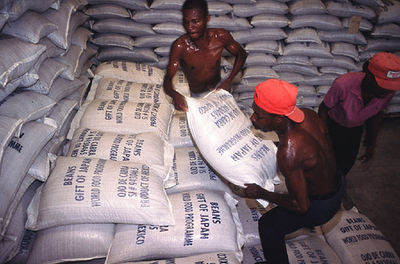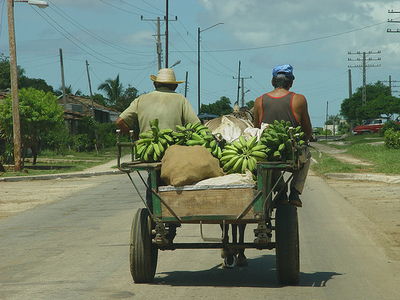“If music be the food of love, play on”, wrote Shakespeare, who could not possibly have anticipated the global food crisis the world is facing today. Rising food prices are a hot topic with bloggers the world over – and the Caribbean is no different. The “music” coming out of the regional blogosphere is anything but lovely – in fact, it's downright discordant – as the Caribbean struggles to find solutions to a crisis that is hitting regional territories hard.
Haiti seems to be feeling the effects of the food shortages the most and The Haitian Blogger thinks that claims of “success” in the island by the United States seem hollow in the face of such dire need:
What of the suffering of the people in indefinite detention, or the hunger of the poor that is so acute that people are eating dirt and describing their hunger pains as “grangou Clorox”; like having your insides eaten away by Clorox?
Haiti is being occupied right now. These occupiers are being paid with money that adds to Haiti’s debt, money that could be used to feed the Haitian people is going to feed, house and train their oppressors.
Blog de Port-au-Prince also believes that the U.S. bears some responsibility for the obstacles Haiti faces:
Thirty years ago, Haiti raised nearly all the rice it needed. What happened? Haiti is far from alone in this crisis…but in poor countries, where malnutrition and hunger were widespread before the rise in prices, there is nothing to cut back on except eating. That leads to hunger riots.

Rice shiptment in Haiti – Photo by Giuseppe Bizzarri for the UN WFP
Bajan Global Report has been keeping an eye on the global food shortage and reports that “Haiti on Sunday named a new prime minister two weeks after his predecessor was ousted over rocketing food and fuel prices that sparked violent demonstrations claiming several lives.”
Living in Barbados chimes in:
A few weeks after reports that people in Haiti rioted about the high cost of food and reports that in Egypt the army had been ordered to bake bread, the ramifications of a major international food crisis are just dawning on lots of ordinary people. Here in Barbados, people have just been struck by the news that local flour prices were increased 30 percent and now wait to see what impact that will have on bread prices and the cost of other baked goods. Gasolene and diesel prices were increased here last week and that too may soon start to factor into the prices of many food items.
The irony of the situation is not lost on him, as he adds:
The situation will be more complicated as the world tries to get “green” by using food stuffs to make fuel. Now, we have the oil and nothing to cook in it. Instead of putting corn into your stomach you will be feeding it, in a sense, to your car. I wonder what the emissions will be like. Odourless, I hope. I just love progress.
But Cuban blogger Ninety miles away…in another country is taking the issue seriously:
Let's start by forgetting this corn ethanol nonsense. It is a negative proposition to begin with. It sounds sexy in this politically correct world of global warming, but take a look at it. First it takes more to create than the energy produced. It is physically impossible to plant enough corn to cover our energy needs, even if we had the infrastructure in place to distribute the ethanol, which we do not, and the cars capable of using it as fuel, which we do not. Let's get real. All we are doing at the moment is allowing the vilest element in our markets to speculate at the expense of the global population, much of which can ill afford it.
In Trinidad and Tobago, even as the mainstream media reports that “Minister of Agriculture, Land and Marine Resources, Senator Arnold Piggott, says there is no food crisis…” blogger Elspeth Duncan at Now is Wow is seeing the signs of the times:
Today the front page of the papers announced: chicken prices going up, flour going up…is there any sign of the Gov't putting things in place for us to grow our own food so we can be self sufficient? Or is it that agricultural land is only good for housing? The other day some friends and I were discussing growing our own food crops and sharing our produce among ourselves.
Her concerns are echoed by Craig Butler at Bahama Pundit, who warns:
If you think that a problem is not on the horizon then think again. The problem as I see it is that far too many of our brothers and sisters are going to bed hungry every night. Don’t just think that this is a problem for the poor because it is not. The Bahamian middle class has practically evaporated and can at best be described as the working poor.

Transporting bananas in Cuba (2006), photo by Pietro Izzo
The Cuban Triangle examines Raul Castro's proposed agriculture policy, saying:
It looks promising. One step alone, the distribution of additional land to private farmers, is almost guaranteed to raise production and put Cuba on a path toward lower imports and lower food prices. But much remains to be seen.
The same could be said of agriculture in Trinidad and Tobago – in considering the reality of food prices in the twin island nation, KnowProSE.com says:
While the Prime Minister tells his political supporters that all will be well, one has to wonder what sort of mindset permitted the use of agricultural lands for residences. And because of that, agricultural crops are also being grown where heavier fertilizers are required due to poor soil. And that, in turn, skews development.
With the global food prices on the rise with less and less food available, one thing I have been considering is getting into farming. Imagine that. While everyone is getting out of agriculture, I'm considering diving into agriculture.
…which may not be a bad idea, given Bajan Global Report‘s comprehensive roundup of “how the global food crisis is affecting our Caricom neighbours as they too try to grapple with the rising food costs in their countries.”
Blogging from St. Lucia, Looshan Ramblings writes:
Hind sight is always 20/20 and we should have not allowed our Agricultural Stock to be marginalised to only production of cash crops but a a balance should have been struck in order to ensure a greater level of food security. Now we are faced with food inflation as has not seen in recent times.
Both can cook, must cook and
Rice is being rationed! Not in Africa or India, but in England and the heartlands of the USA. In Britain rice is being rationed by shopkeepers in Asian neighbourhoods to prevent hoarding; while in the US Wal-Mart has created a first–there has never been food rationing in the US. The restrictions are being imposed on retail and wholesale customers.
But Jamaican Gordon Swaby tries to put a positive (if slightly controversial) spin on the whole situation:
What this food crisis is doing is forcing us to be self reliant; and for that I am very happy, after we realize that products are getting too expensive to be imported, then we will have no choice but to produce our own. And after that happens, we’ll have more than we need, and from that we’ll start exporting; instant gratification. So yes, i hope things continue to get expensive, it will force us to become creative, from sorrow comes joy.
Support our work
Global Voices stands out as one of the earliest and strongest examples of how media committed to building community and defending human rights can positively influence how people experience events happening beyond their own communities and national borders.
Please consider making a donation to help us continue this work.







4 comments
Thank you for the mention, greatly appreciated.
Thanks for capturing the viewpoints of the region with this blog. I have to agree with the last comment by Gordon Swaby – and interestingly wrote a similar viewpoint on my blog. I think that the food crisis will force us to mend our unsustainable ways and since necessity breeds ingenuity we will become a whole lot more creative and satisfied with local solutions.
http://www.caribbeanlandandproperty.com/blog/index.php?/archives/76-Eat-Local-and-Get-Farming-Solutions-to-the-Global-Food-Crisis.html#extended
Onelove
Terri